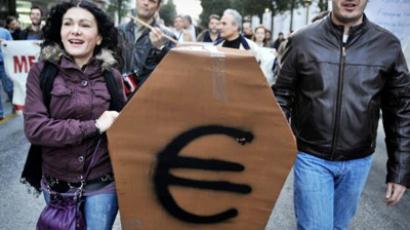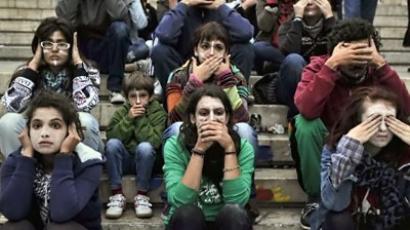Greece: cradle of austerity
Greece wakes up this morning to a new age of austerity. Parliament has passed a fresh package of pay cuts and tax hikes in attempt to stave off bankruptcy. The decision has been met with violent unrest in Athens.
Protests in Greece have become a common occurrence, but behind the rallies is public anger at years of austerity.For the people that has meant wage cuts many people by 30 per cent in most cases. On top of that, tax hikes, cuts to pensions and cuts to public spending. Unemployment is cripplingly high and the country has seen the emergence of a new generation of homeless. It seems these measures have affected everyone in Greece.The young and the old, people from all walks of Greek life joined the two day protest, the largest Greece has seen since the crisis began, and one of the most violent too.“We fight peacefully for our rights!” protesters shout. But it was not to be, the anger once again boiling over with fights breaking out, not just with the police, but among the protestors themselves.“Greek society is facing a social disaster,” says Panagiotis Sotiris from the University of the Aegean. “For the past two years we have received austerity package after austerity package in the name of the debt crisis. People are beyond their breaking point. They cannot stand it anymore.”Eurozone leaders had announced an agreement on a rescue policy would be decided at an EU weekend summit. But that has now been pushed back amidst internal disagreements.It is another blow to the credibility of their continued assertions that they can provide a solution.“When people are becoming poorer and poorer, they are seeing public sector services collapsing – hospitals, schools, universities,” Sotiris said. “They are facing an extreme deterioration of their living conditions.”It is not just the protestors who resent the proposed changes. Though the vote eventually passed, some top government officials did oppose. One opposition member said he had voted for the measures, but was now struggling with his conscience.And he is not the only one. After the protests at the start of the month, a police major told RT of the pressure for the riot police involved in these events too.“It is very hard to describe the feelings of the policemen, because they are too a social and a professional group, who are suffering by the economic measures that the government has to take,” said police spokesman Athanasios Kokkalakis. “Sometimes it is very hard for them to take part in these protests as working people.”But once more, they had to take to the streets to push back protesters, even those who wanted to make their point peacefully.The rest of Europe and the eurozone leaders are going to be watching this very closely. This is not just a problem that affects Greece; it is a situation that affects the entire eurozone.This shows what the people are willing to go through to have their voices heard. But the people of Greece are going to have to wait a while longer to see if anyone now is ready to listen.
Economic analyst and author Michael Mross told RT Greece’s withdrawal from the eurozone would not make the situation any better for European countries.
“The only country that can pull out of the eurozone is Germany. It has to pull out – this would produce a great relief. If Greece pulls out, the euro debt will still be there,” he explained.














